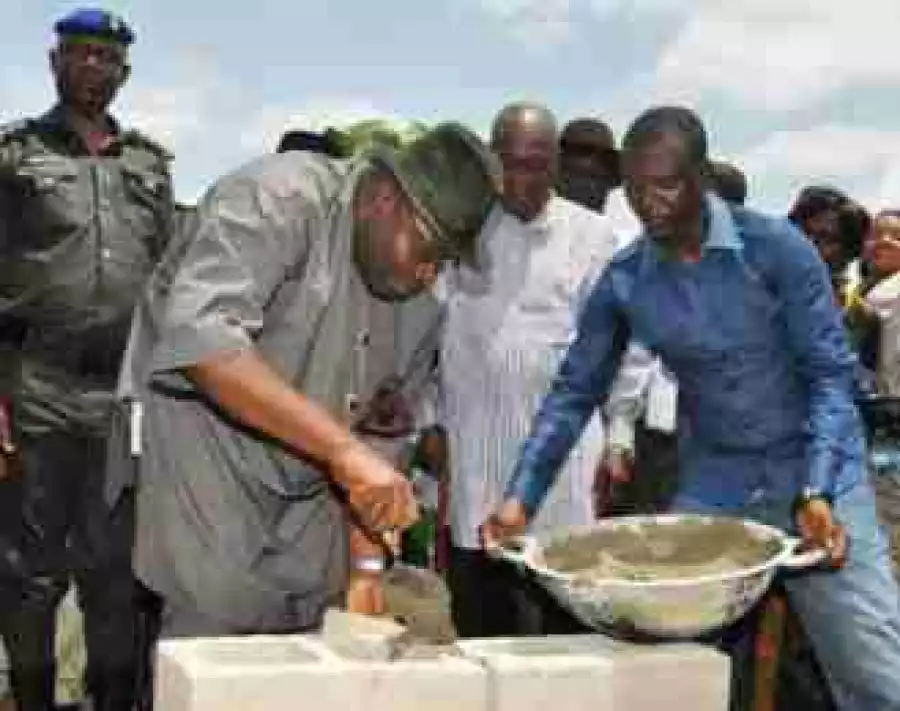Bayelsa & oil: At last, something to show after contributing trillions to nation’s coffers

Bayelsa & oil: At last, something to show after contributing trillions to nation’s coffers
Although Bayelsa State has just achieved its coming of age the saga of its existence over the last twenty-one years is replete with political echoes which suggest that the territory that it occupies has a level of importance in the national arena that belies its youth.
Apart from the fact that the birthplace of Nigeria’s oil and gas industry is located there its emergence as the birthplace of the first person of Southern Minority origin to become President of the nation has thrown the young state even more prominently into the spotlight of public opinion.
This is especially so because the governors who have held power in the state since the advent of democratic rule in 1990, are individuals whose impact on the political scene has been noticeably controversial.
The late D.S.P Alamieyeseigha, who designated himself the “Governor General of the Ijaw Nation” and openly espoused the cause of resource control as a central pillar of his policy thrust, set the tenor of representative governance of the state when he built the first major highway to traverse the core swamp terrain of the heartland of the Niger Delta leading to his hometown of Amassoma.
Until then common wisdom expressed by most developers from other parts of Nigeria held that it would be too difficult and prohibitively expensive to access the riverine communities of the Niger Delta by road. In spite of this, foreign companies and the Federal Authorities have spent huge sums to access these areas in order to exploit the natural resources and earn humongous returns for the national coffers and a few privileged private individuals.
As a consequence although Bayelsa State occupies a territory that has contributed trillions of dollars for the national treasury since oil was discovered and first exported from the Öloibiri pioneer oil well in 1957, the impact on the welfare and development of the communities in the territory remained symptomatic of this neglect throughout the period from then until the state was created in 1996.
It is a fact for example that when the state was founded not a single community in the territory including the state capital of Yenagoa was on the national electricity grid. There were no major urban metropolises in the entire territory as most towns were home to shrinking populations of migratory youth and sedentary elderly people. Local employment was so scarce outside of the fields of subsistence farming and improvident public services that hardly anyone of working age and ability chose to stay at home.
Not a single one of the four indigenous governors who have ruled Bayelsa can boast of coming from a town that was accessible by road when the state was founded.
None of them had lived consistently in the territory for decades before the state was founded. The entire Yenagoa LGA itself was a collection of villages with an overall population of less than fifty thousand people at the time, and it showed all the signs of developmental decline and decay, The area was redolent with the symptoms of decline characteristic of post-colonial neglect of a once vibrant but remote province, which had apparently lost political relevance with the departure of the colonial administrators.
This perception is particularly surprising especially because at the onset of colonial administration this was one of the territories where trade in agricultural produce such as palm oil and exotic spices had been developed by the Royal Niger Company into the basis for the eventual amalgamation of the entire country. It is hard to explain therefore why when oil and gas became an even more substantial component in the economy of the independent nation the services and communal autonomy of the territory should decline to a state of almost hopeless debility. It is this dysfunctional reality that underlay agitations by the communities in the territory that eventually justified General Sani Abacha’s decision to create Bayelsa State.
In the period since the creation of the state its presence, and participation in national affairs as a component of the Federation, has been noticeably prominent. When D.S.P Alamieyeseigha took over as the first elected Governor of the state he quickly established infrastructural objectives that had long been neglected as priorities of his administration and this led him to confront the central government continually.
As a result Bayelsa became characterised as something of a “prodigal” sibling of the older states and Alamieyeseigha himself was regarded as an advocate of radical restructuring of the relations between the centre and the regional authorities. Unfortunately this viewpoint appeared to gain traction not as the basis for collaboration between the central authorities and the state government but rather as a motive for rivalry.
Alamieyeseigha was eventually to fall victim to the consequences of this conflict as political rivalries emanating from the issues provoked by his attitude became central to the national discourse. It was this outcome that led to the ascendancy of Dr. Goodluck Jonathan and eventually to the first time that the Presidency of the nation was held by a member of a Southern minority ethnic group.
This was the major consequence of the emergence of Bayelsa State as a vital political component of the Federal state in the new era of representative governance for Nigeria. Goodluck Jonathan’s ascent to the Presidency ensured that his state of origin became the focus of attention of a wide cross section of analysts and observers and that the leadership of the state thus became the bellwether of leadership in the entire South-South geo-political zone in recent times.
As a consequence Bayelsa State occupies a role that is of paramount importance as a symbol of the building of the nation even while its own infrastructural and administrative development remains highly deficient in many respects.
In the annals of Nigerian politics this is of historic importance because at the same time that Bayelsa State is working towards the development of its local capacity in order to serve its long neglected communities it remains a key producer of revenue for the entire Federation. As it arrives at its twenty-first birthday the state must reflect both the initiatives of its leadership at home as well as its integration with the larger national entity.
Without doubt the priorities that were identified by Chief Alamieyeseigha as being of integral value to the building of a credible unit of governance for the local communities remain imperative today. However it is only in recent years that many of these priorities have been revived in the actual operations of the state government. During the period of the state’s intrusive cooperation with the Federal government when Goodluck Jonathan was President many local initiatives were ironically neglected.







![Snake Skin Beauty (2024) [Chinese]](https://www.memesng.com/r/storage.waploaded.com/images/ef481e7e5ad06fe603d588a2f2e17b90.jpg?w=50&ulb=true&ssl=1)
![My Dear Donga (2024) [Telugu]](https://www.memesng.com/r/storage.waploaded.com/images/536e471183e6285f2621d5e66511aceb.jpg?w=50&ulb=true&ssl=1)
![La Soga 3 Vengeance (2023) [Spanish]](https://www.memesng.com/r/storage.waploaded.com/images/920fbd2c4e72b0f304a41aa7b09cffe9.jpg?w=50&ulb=true&ssl=1)
![Yavarum Vallavare (2024) [Tamil]](https://www.memesng.com/r/storage.waploaded.com/images/1f00382110f5c04439cd284879674537.jpg?w=50&ulb=true&ssl=1)










![Suji and Uri (2024) [Korean] (TV series)](https://www.memesng.com/r/storage.waploaded.com/images/394b198e59e3725ad4fa904e225d43dc.jpg?w=50&ulb=true&ssl=1)
![In Cold Blood (2024) [Korean] (TV series)](https://www.memesng.com/r/storage.waploaded.com/images/64d0b2050777280ade35b2797b34c503.jpg?w=50&ulb=true&ssl=1)
![Hard to Find (2024) [Chinese] (TV series)](https://www.memesng.com/r/storage.waploaded.com/images/cbbaa0d3ae912198b992a53af30d2361.jpg?w=50&ulb=true&ssl=1)
{{comment.anon_name ?? comment.full_name}}
{{timeAgo(comment.date_added)}}
{{comment.body}}
{{subComment.anon_name ?? subComment.full_name}}
{{timeAgo(subComment.date_added)}}
{{subComment.body}}